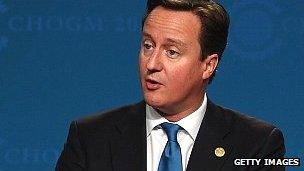David Cameron vows to boost infrastructure projects
- Published
- comments

The prime minister says there is cause for optimism over the economy
David Cameron has promised an "all-out mission" to kick-start infrastructure projects and revive the economy.
Writing in the Financial Times, the PM, external said he had given the go-ahead for two power plants in Yorkshire that would create 1,000 construction jobs.
Meanwhile, his deputy Nick Clegg announced which firms in England would benefit from the £950m final instalment of the regional growth fund.
Labour says neither announcement represents new investment.
Mr Cameron admitted in the Financial Times that the eurozone crisis was having a "chilling effect" on global growth and he warned there were "no short-cuts to success".
Broadband jobs
But he urged people to be optimistic, pointing to growing trade with India and China, and warned that pessimism and fear "can become self-fulfilling prophecies".
Mr Cameron spelled out a three-point plan based on confronting Britain's debts, improving competitiveness and building global trade.
"I am confident that we can both resolve the crises at hand and come through them with an economy that is stronger and fundamentally fairer," he wrote.
As well as approving power plants at Ferrybridge, West Yorkshire, and Thorpe Marsh, near Doncaster, Mr Cameron welcomed news that BT will complete its roll-out of superfast broadband by 2014 - generating work for 500 more engineers.
He said more infrastructure announcements could be expected over the coming months.
Meanwhile, Mr Clegg says the remainder of the £1.4bn regional growth fund cash will help create or safeguard "hundreds of thousands of jobs".
He told BBC Radio 4's Today that every pound of government money given to companies would bring £6 of private sector investment "providing more bang for your buck".
Ed Miliband: "I'm afraid the government's plans are too little, too late, because we've got a perfect storm in our economy"
Mr Clegg said the coalition government was seeking to "rewire the British economy" and cut the past "over-reliance of firms on decision makers in Whitehall".
In a written statement to Parliament, Business Secretary Vince Cable said there had been 492 bids for £3.3bn funding. A panel chaired by Lord Heseltine helped decide on the 119 successful bids for the £950m available.
Shadow Business Secretary Chuka Umunna accused the prime minister of being "out of touch" and said the government was failing to address a lack of economic growth.
He said the "long-delayed funding" represented a two-thirds cut, with one year's budget of the scrapped regional development agencies being paid out over three years.
"Power stations already in the pipeline are finally being given the green light, but no investment is actually being brought forward," he said.
"This does not amount to the significant plan for jobs and growth Britain's economy desperately needs right now."
- Published25 October 2010
- Published25 October 2010